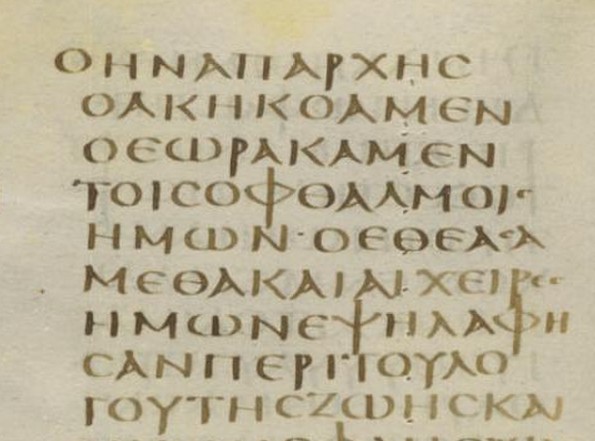A scene from The Canterbury Psalter (12th century)
Blog
First John on its Own Terms

For those of us whose theological home base is Paul, pondering First John is wonderful but strange. There’s no contradiction between John & Paul, but the voice is astonishingly different. One major difference: I John is not structured by the “once lost, now saved” schema.
Where Paul frequently reminds his readers what they once were, what they left behind, how they have been transformed, what they have now turned to, John doesn’t bring it up. In fact, John doesn’t provide any terms or structures that even invite reflection on these things.
That old-vs-new structure is replaced, for the most part, by the dynamic of light vs darkness (which in turn is developed and applied via other categories, like love vs. hate). There’s some salvation history (the darkness is passing), but no ordo salutis or conversion.
This Johannine way of thinking takes some getting used to. Among the benefits are its immediacy & simplicity. Questions like “if I am a Christian, why do I sin?” turn into “If I am in the light, why don’t I walk in the light?” A bracing translation of concerns, to be sure.
Read properly, I John can be a special opportunity for people who became Christians at an early age. If you got saved at age 8, a testimony of having turned from sin or dead works to being new in Christ is spiritually true, but not a direct map onto your biography.
That is, you probably can’t read Eph 2 “we were dead in trespasses” and directly map it onto your experience (at age 7!), the way some adult converts can. It takes some fancy footwork to confirm that this death-to-life structure is spiritually true; you fit your bio to the grid.
I John doesn’t require, invite, or maybe even allow that kind of tension between autobiography & doctrinal understanding. It simply sets you in the presence of God, who is Light, & our propitiation. It then equips you w/a series of diagnostic tests (social, theological, moral).
For some readers (raised Christian & trained in Paul’s categories), the result is shocking: they think John must be preaching perfectionism. They struggle to draw a line of conversion in the book, but nowhere they can draw one makes much sense.
I say, be patient & let I John have its perfect work. At the synthetic, systematic-theological level, Paul & John can be combined & harmonized just fine. But at the level of hearing from God via I John, we’ve got a message re: the word of life: “God is light, in him no darkness.”
[This was a Twitter thread that I’m posting here for stable access. The structure (nine mini-paragraphs w/the same number of characters in each) was dictated by Twitter’s format. These thoughts emerged from 9 hours of discussing I-III John with seniors in the Torrey Honors College.]
About This Blog

Fred Sanders is a theologian who tried to specialize in the doctrine of the Trinity, but found that everything in Christian life and thought is connected to the triune God.


